最新2019年整理过去分词_语法___高中英语必修五_unit1《Great_scientists》Grammar课件_新人教版必修
- 格式:ppt
- 大小:5.54 MB
- 文档页数:28
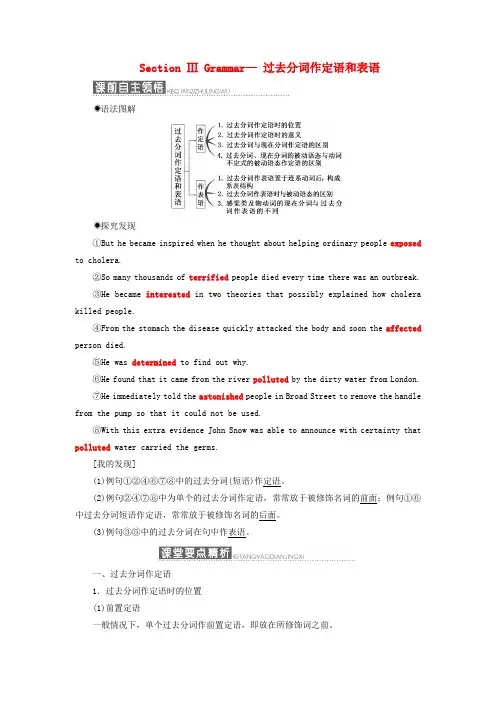
Section Ⅲ Grammar—过去分词作定语和表语语法图解探究发现①But he became inspired when he thought about helping ordinary people exposed to cholera.②So many thousands of terrified people died every time there was an outbreak.③He became interested in two theories that possibly explained how cholera killed people.④From the stomach the disease quickly attacked the body and soon the affected person died.⑤He was determined to find out why.⑥He found that it came from the river polluted by the dirty water from London.⑦He immediately told the astonished people in Broad Street to remove the handle from the pump so that it could not be used.⑧With this extra evidence John Snow was able to announce with certainty that polluted water carried the germs.[我的发现](1)例句①②④⑥⑦⑧中的过去分词(短语)作定语。
(2)例句②④⑦⑧中为单个的过去分词作定语,常常放于被修饰名词的前面;例句①⑥中过去分词短语作定语,常常放于被修饰名词的后面。
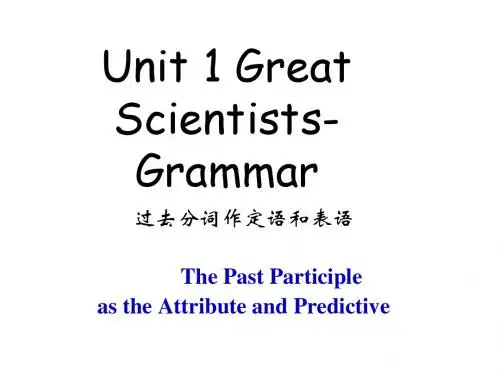
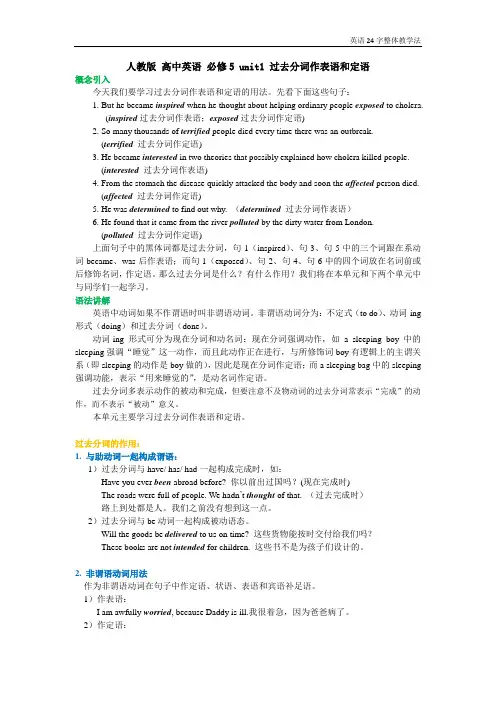
人教版高中英语必修5 unit1 过去分词作表语和定语概念引入今天我们要学习过去分词作表语和定语的用法。
先看下面这些句子:1. But he became inspired when he thought about helping ordinary people exposed to cholera.(inspired过去分词作表语;exposed过去分词作定语)2. So many thousands of terrified people died every time there was an outbreak.(terrified过去分词作定语)3. He became interested in two theories that possibly explained how cholera killed people.(interested 过去分词作表语)4. From the stomach the disease quickly attacked the body and soon the affected person died.(affected过去分词作定语)5. He was determined to find out why. (determined过去分词作表语)6. He found that it came from the river polluted by the dirty water from London.(polluted过去分词作定语)上面句子中的黑体词都是过去分词,句1(inspired)、句3、句5中的三个词跟在系动词became、was后作表语;而句1(exposed)、句2、句4、句6中的四个词放在名词前或后修饰名词,作定语。
那么过去分词是什么?有什么作用?我们将在本单元和下两个单元中与同学们一起学习。
语法讲解英语中动词如果不作谓语时叫非谓语动词。
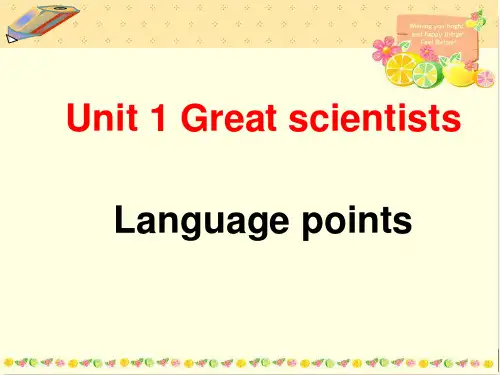
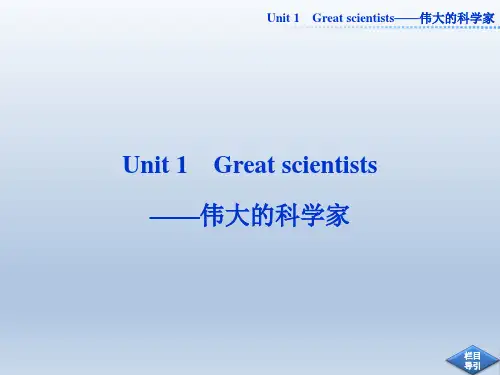
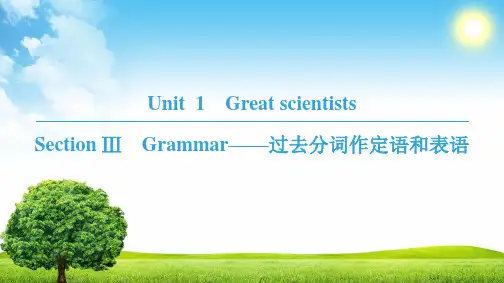
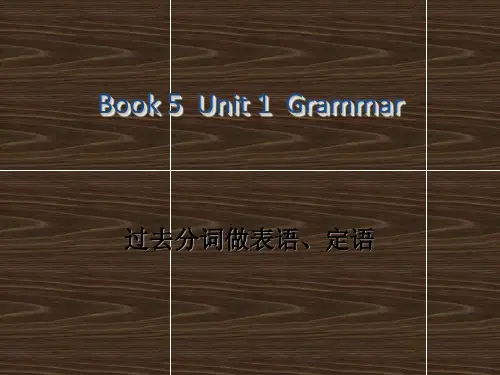
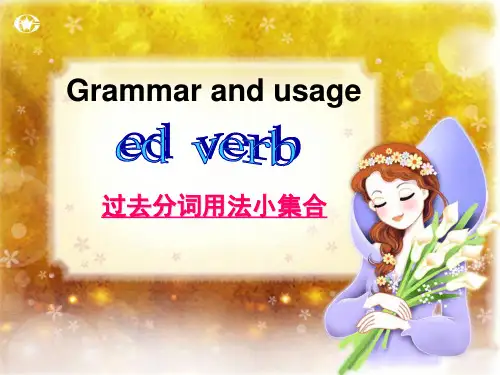
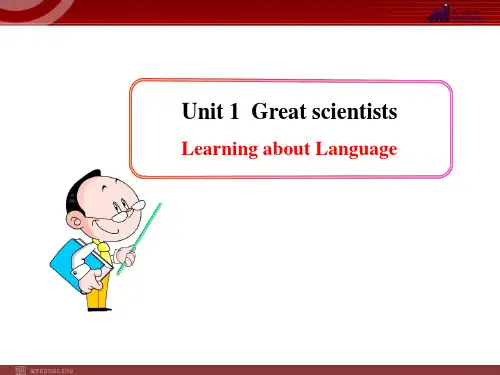
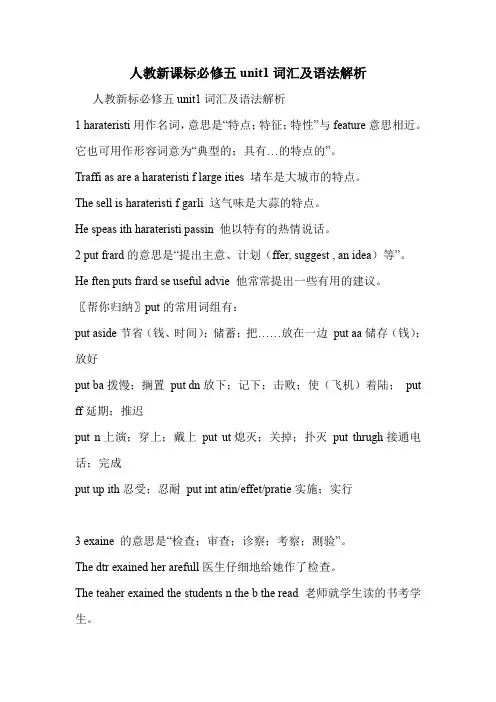
人教新课标必修五unit1词汇及语法解析人教新标必修五unit1词汇及语法解析1 harateristi用作名词,意思是“特点;特征;特性”与feature意思相近。
它也可用作形容词意为“典型的;具有…的特点的”。
Traffi as are a harateristi f large ities 堵车是大城市的特点。
The sell is harateristi f garli 这气味是大蒜的特点。
He speas ith harateristi passin 他以特有的热情说话。
2 put frard的意思是“提出主意、计划(ffer, suggest , an idea)等”。
He ften puts frard se useful advie 他常常提出一些有用的建议。
〖帮你归纳〗put的常用词组有:put aside节省(钱、时间);储蓄;把……放在一边put aa储存(钱);放好put ba拨慢;搁置put dn放下;记下;击败;使(飞机)着陆;put ff延期;推迟put n上演;穿上;戴上put ut熄灭;关掉;扑灭put thrugh接通电话;完成put up ith忍受;忍耐put int atin/effet/pratie实施;实行3 exaine 的意思是“检查;审查;诊察;考察;测验”。
The dtr exained her arefull医生仔细地给她作了检查。
The teaher exained the students n the b the read 老师就学生读的书考学生。
exaine指的是仔细观察以了解或发现什么东西,也可用于医生检查病人,以书面或口头的形式考察学生的知识与能力。
he指的是通过检查以确保某事物正确、安全、满意或处于良好状态,核对,核实某物等。
test指的是检验和衡量某物或某人的品质、质量等,测验某人在某方面的知识或能力,还有实验、考验的意思。
He is exaining a ther 他正在查验一个理论。
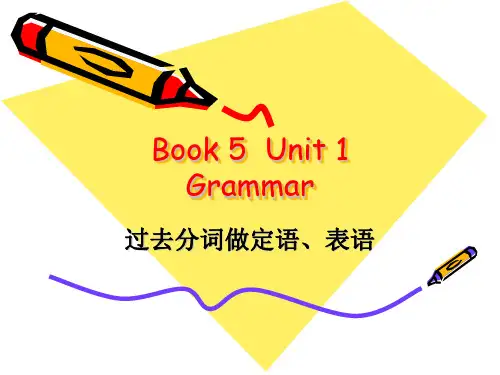
必修5 Unit1 Great scientistsPart 1. Warming up1.explain及物动词(vt.)解释;说明;阐明[(+to)][+wh-][+(that)]He explained that he had been cheated. 他解释说他是上当受骗了。
Can you explain how the machine operates?你能解释一下这机器是如何运转的吗?Please explain this rule to me.请给我讲解一下这条规则。
不及物动词(vi.)解释;说明;辩解I've got to explain about it. 我得解释一下此事。
2.characteristicn. 特征;特性Kindness is one of his characteristics.adj. 独特的I heard my friend’s characteristic laugh.be characteristic of sb./sth. 是.....的特性Such bluntness is characteristic of hin. 如此迟钝是他的特性。
3. Who put forward a theory about black holes?put forward 提出(建议等);提名;提前,把时钟往前拨He put forward a new plan. 他提出一个新计划。
May I put your name forward as a possible chairman of the committee?我能否提名你当委员会主席?[归纳拓展]put down 记下;镇压put out 关掉;熄灭put aside 放在一边;储存;保留put off 推迟;延期put up 建造;举起;张贴put on 穿上put away 收好选词填空(put off, put up, put forward, put aside, put out)①The plan that you _____ at the meeting is wonderful.②Many tall buildings were _____ along the road.③Firefighters have been called to _____ the fire in the city center.④He has a little money to _____ for a rainy day.⑤Don’t _____ until tomorrow what can be done today.Part 2. Pre-reading, reading and comprehending1. Do you know how to prove a new idea in scientific researchhow to prove a new idea 为“疑问词+不定式”结构,该结构可在句中作主语、宾语、表语等。
人教新课标必修五unit1词汇及语法解析1. characteristic用作名词,意思是“特点;特征;特性”与feature意思相近。
它也可用作形容词意为“典型的;具有…的特点的”。
Traffic jams are a characteristic of large cities. 堵车是大城市的特点。
The smell is characteristic of garlic. 这气味是大蒜的特点。
He speaks with characteristic passion. 他以特有的热情说话。
2. put forward的意思是“提出主意、计划(offer, suggest , an idea)等”。
He often puts forward some useful advice. 他常常提出一些有用的建议。
〖帮你归纳〗put的常用词组有:put aside节省(钱、时间);储蓄;把……放在一边put away储存(钱);放好put back拨慢;搁置put down放下;记下;击败;使(飞机)着陆;put off延期;推迟put on上演;穿上;戴上put out熄灭;关掉;扑灭put through接通电话;完成put up with忍受;忍耐put into action/effect/practice实施;实行3. examine的意思是“检查;审查;诊察;考察;测验”。
The doctor examined her carefully.医生仔细地给她作了检查。
The teacher examined the students on the book they read. 老师就学生读的书考学生。
examine指的是仔细观察以了解或发现什么东西,也可用于医生检查病人,以书面或口头的形式考察学生的知识与能力。
check指的是通过检查以确保某事物正确、安全、满意或处于良好状态,核对,核实某物等。
高中英语必修五Unit1重点单词积累以下是小编整理的关于人教版高中英语必修五单词及语言点总结:Unit 5 Theme parks,旨在提供综合运用所需材料!词汇学习是高中学习中的一个重要环节。
提高英语语言基本技能主要依靠词汇量的提升。
同学们应该掌握好所学的英语单词!高中英语必修五单词及语言点总结Unit 1 Great ScientistsWord usage1. attend v 1)to take care; give attention2) to be present at3) to take care of ; take part in; pay attention to sth; look afterHe did not attend the meeting yesterday.The school was attended almost entirely by local childrenThere was no one to attend him but Tina.She didn't attend to what I was saying.2. expose v 1) to make visible to2) to reveal the guilt or wrong doing ofThey consider it almost a crime to expose children to violence and sex on TV.Their scheme was exposed.Don't expose the film to light.Cleaning exposed the grain of wood.3. cure v. 1)bring a person back to healthn 2) curing and being curedAntibiotics help to cure many diseases that were formerly fatal.Penicillin cured him of pneumonia.You cured me completely.There's no known cure for a cold.She tried every means to cure her child of the bad habit4. absorb v :1) to occupy the full attention, or time2) take and suck in, take in heat and light etc.Cotton gloves absorb sweat.So many good ideas! It's too much for me to absorb all at once.The old man was utterly absorbed in the book.Small businesses are absorbed by big ones.She won't be able to absorb another heavy blow.5. contribute v 1) join with others in giving help, money etc.2) have a share inHe contributed half of his savings to the relief fund.He didn't contribute one idea to the documentHe contributed generously to the Red Cross.He never contributes to the discussionThe scientist often contributes to an academic journal6. control v. to exercise authoritative or dominating influence over; directn. to hold in restraint; checkShe is skillful enough to control the machine now.The British government at that time controlled the islandYou must learn to control your temper.They have no control over him.The helicopter landed with Joe at the controls.7. determine v. to reach a decision; resolveShe determined to go that very afternoonMy mom's encouragement determined me to go on with my study He was determined to win the gameThe court determined that the man was guilty of drunken driving.They have determined where the new school will be built.8. devote v. to give or apply entirely to particular activity, cause or a personHe devoted himself to writing.He was still devoted to the study of chemistryHe has devoted his whole life to benefiting mankind.9. confuse v. 1) to cause to be unable to think clarity or act with intelligence2) to assemble without order or sense; jumbleThey confused me by their conflicting adviceYou confused Australia with Austria.His granddaughter confused the papers on his desk.10. enthusiastic adj. Having or demonstrating enthusiasmDavid is very enthusiastic about the plan.They are enthusiastic admirers of that movie star.My parents are enthusiastic skiers.11. valuable adj. 1) worth of a lot of money2) having great usefulness or valueHe bought me a valuable diamond ring as a birthday present This experience is valuable to me.12. especially adv. 1) to extend or degree deserving of special emphasis2) particularly, in particularI liked all the children, Tom especially.We need to be especially careful.The book is compiled especially for beginners.13. conclude v. 1) to bring to an end; close2) to arrive at but the process of reasonWe concluded our meeting at 9 o'clock.What can you conclude from these observations?He concluded that he would wait a little longer.The meeting concluded after two hours.14. replace v. 1) to put back into a former position or place2) to take or fill the place ofShe replaced the receiver.The brakes have to be replaced.Electric lights have replaced candles.I will replace the cup I broke.15. puzzle n. 1) something that baffles or confuses2) something, such as a toy or game, that tests one’s ingenuityv. 3) to baffle or confuse mentallyWhat puzzles me is why they didn't show up.He looked a little puzzled.His recent behavior puzzles me.Her decision was a puzzle to him.16. admire v. to regard with pleasure, wonder, and approvalWe admire her for her diplomatic tact.He admires your poems very much.He admired her new hat.17. appear vi. 1) to become visible2) to seem or look to be3) to come before the publicGradually a smile appeared on her face.It appears they are right.He appeared to be talking to himself.The famous singer is appearing this fall at the Music Festival.Useful expressions1. put forward to offer( an idea, suggestion etc.) for considerationHe put forward a very good suggestion at the meeting.You ought to put your watch forward ten minutes.2. believe in 1) to accept as true or real2) to have a firm religious faith3) to have faith or trust inChristians believe in Jesus.We believe in him.Jim believes in fresh air and morning exercises.3. in addition adv. As well asThey eat a great deal of fruit in addition.In addition, the course also produces practical experience.4. deal with: do with, concern sthHe has learnt to deal properly with all kinds of complicated situations.This book deals with an important issue.I don’t know what they do with the problem=I don’t know how they deal with the problem5. make sense 1) to make sth understand or reasonable2) to have a clear meaning3) to be a wise course of actionThis sentence doesn't make sense.Your story doesn’t make sense to meHere, read the sentence. It doesn’t seem to make sense.6. base on: to use particular information or facts as a point from which todevelop an idea, plan, etc.This play is based on a true story.We should base our theory on facts.7. apart from: without considering; except forHe lives apart from his family.Apart from a few faults, he is a trustworthy teacher.Apart from the the cost, the dress doesn’t suit me.8. look into : to investigateWe will look into this matter together.9. join in 1) to participate with in an act or activity2) to become a part or member of3) to put sth togetherWill you join me in a walk?He jion the army.Where does the path join the road?Tie a knot to join those two piece of rope.10. go over 1) go examine2) to look at or examine for a purpose3) to repeatWe went over the building.We must go over the account s carefully before we settle down. GO over the lesson again。